Advertisement
Supported by

Brazil’s Lula Meets Xi in China as They Seek Path to Peace in Ukraine
Brazil has been reluctant about choosing sides in the war, as its new president, Luiz Inácio Lula da Silva, seeks to rebuild the country’s ties with Beijing.
- Share full article

By Keith Bradsher
Reporting from Beijing
President Luiz Inácio Lula da Silva of Brazil met in Beijing on Friday with China’s top leader, Xi Jinping, and the two leaders declared in a joint statement that negotiation was “the only viable way out of the crisis in Ukraine.”
In the statement, they avoided the words “invasion” or “war” and offered few specifics about how to bring Russia or Ukraine to the table after more than a year of war. At the same time, Mr. Lula called on Friday for China’s territorial integrity to be respected with regards to Taiwan, a similar stance to the one President Emmanuel Macron of France took last weekend after he met with Mr. Xi in China .
The joint statement underscored the delicate lines that China and Brazil have tried to chart on the war in Ukraine: Each has refused to take an explicit side, has called for peace talks and has preserved business ties with Russia. Beijing, in particular, has aligned itself with Moscow in countering American influence abroad and what Mr. Xi calls a U.S. campaign to prevent China’s rise.
The careful positioning by Mr. Xi and Mr. Lula stands against the backdrop of Beijing’s worsening relations with Washington on a range of issues, and as China wages a diplomatic campaign to raise its stature — and diminish that of the United States — in Europe, the Middle East, Africa and Latin America.
American and some European officials and have been critical of China’s 12-point outline of issues that should be considered in a peace agreement, because China has not suggested that Russian forces must withdraw from occupied Ukrainian territory as part of any deal.
There have been no known peace talks between Moscow and Kyiv in the past 12 months, and each side has ruled out a cease-fire based on the current battlefield conditions. On Friday, President Vladimir V. Putin of Russia signed a law that is set to create a system for electronic draft notices, and to make it more difficult to avoid a draft .
In contrast to its lack of details about Ukraine, Brazil and China’s joint statement was direct about the territorial integrity of China, which was defined to include Taiwan, a self-ruled island democracy over which mainland China claims sovereignty.
“The Chinese side expressed great appreciation in this regard,” the relevant passage of the statement concluded.
Although the United States and Europe have urged many countries to support Ukraine, when it comes to Taiwan Mr. Lula does not face the same pressure that Mr. Macron does to align France with its allies. After his statements about the island unsettled American and E.U. officials, Mr. Macron walked them back and said France supports the status quo.
Mr. Lula’s official visit to Beijing began on Friday in Tiananmen Square, in the heart of Beijing, where Chinese state media showed him side by side with Mr. Xi in front of the Great Hall of the People, as Chinese soldiers marched past them with fixed bayonets.
Moving inside the Great Hall on Friday afternoon, Mr. Lula said he wanted the relationship between the two countries to “transcend trade,” according to a release from Mr. Lula’s leftist party, the Workers’ Party.
“No one is going to prohibit Brazil from improving its relationship with China,” he said.
Mr. Lula traveled to Shanghai and then Beijing this week with powerful incentives to accommodate China’s interests. In recent weeks, the Brazilian leader has suggested that China should be part of a global effort to bring about peace talks, arguing that countries not directly involved in the conflict are better positioned to mediate the negotiations.
“Brazil as a country is more and more in line with the Chinese narrative,” said Moritz Rudolf, a specialist in China’s foreign policy at Yale Law School.
China has not condemned Russia’s invasion, and Mr. Xi remains closely aligned with Mr. Putin, visiting Moscow last month. Chinese officials say that Beijing is not on Moscow’s side in the war, and that they will not send weapons for Russia to use in Ukraine, but Chinese state media has parroted Kremlin claims blaming NATO for starting the conflict.
China has meanwhile continued high-level meetings with Russian officials, beyond Mr. Xi’s trip to Moscow. Its Ministry of National Defense announced on Friday that the country’s defense minister, Li Shangfu, would travel to Moscow on Sunday for a four-day trip.
Brazil has criticized Russia’s invasion in carefully worded statements, but its position is complicated by its reliance on Russia for about a quarter of its fertilizer imports, which are crucial to Brazil’s enormous agriculture industry. Mr. Lula has also suggested that Ukraine’s president and NATO share some blame for the war, and he has resisted calls to send weapons to Ukraine.
Recently leaked Pentagon documents suggest that Ukraine is increasingly desperate for arms to hold back Russian troops, and in particular needs the kind of air defenses that Brazil can supply. European nations have moved to send more advanced weapons — the German government on Thursday approved a Polish request to export five MIG-29 fighter jets to Ukraine. But with Western stockpiles diminished, Ukraine and its allies have put pressure on some nations that have avoided getting involved to send help.
Colombia and Argentina, which like Brazil are led by leftists, have refused to send weapons to Ukraine, with their leaders arguing that they will not take sides in the war.
But some of the leaked U.S. intelligence documents indicate that Ecuador’s right-wing government in recent months considered sending Soviet-designed MI-17 helicopters to Ukraine, a move supported by the United States.
Ecuador would have been the first Latin American country to send weapons to Ukraine, according to the documents. It was not clear from the documents whether Ecuador followed through. The potential transfer was first reported by Ecuadorean media in January .
Ecuador’s foreign ministry on Thursday denied any negotiations with Ukraine, saying in a statement that a “donation of military goods and supplies is not mentioned in the Ecuadorean legislation, so an operation of these characteristics would be impossible.”
Mr. Lula introduced the idea of a peace group formed by such countries, and recently told President Volodymyr Zelensky of Ukraine that he would discuss the idea with Mr. Xi, making Mr. Lula the latest in a string of leaders offering a vision for possible negotiations.
Brazil is Russia’s largest buyer of fertilizer, purchasing roughly $1.9 billion in chemicals from Russia in 2019, though Russia’s fertilizer industry is still dwarfed by its oil and gas exports. Although its energy business with Europe has dwindled under Western sanctions, Russia has increased its trade on this front with nations including China and India , which has made up for shortfalls in Russia’s energy business.
Mr. Lula’s visit to China is part of an effort to repair relations that had suffered under Brazil’s previous president, Jair Bolsonaro. Bringing Mr. Xi his thoughts on a potential path to peace for Ukraine has put Brazil back into the geopolitical conversation after Mr. Bolsonaro’s contentious and isolationist administration left office.
Reporting was contributed by Jack Nicas , André Spigariol , Genevieve Glatsky , Julie Turkewitz and Christopher F. Schuetze .
Keith Bradsher is the Beijing bureau chief for The Times. He previously served as bureau chief in Shanghai, Hong Kong and Detroit and as a Washington correspondent. He has lived and reported in mainland China through the pandemic. More about Keith Bradsher
Our Coverage of the War in Ukraine
News and Analysis
The authorities in Poland and Germany have arrested at least five of their citizens and accused them of spying for Russia or of offering to help Moscow commit violence on European soil, including a “possible attack” on the president of Ukraine, Volodymyr Zelensky.
The drone combat in Ukraine that is transforming modern warfare has begun taking a deadly toll on one of the most powerful symbols of American military might — the tank — and threatening to rewrite how it will be used in future conflicts.
At least 17 people were killed and scores more injured when three Russian missiles struck a busy downtown district of Chernihiv , north of Kyiv, Ukrainian officials said.
Resuming U.S. Military Aid: Much-needed munitions like artillery shells could start arriving relatively quickly , but experts say it could take weeks before U.S. assistance has a direct impact on the war . What would $60 billion buy ?
A Race to Hold the Line: The days of lightning battlefield breakthroughs may be over. With Russia preparing to make a big push, the Ukrainians can do little but dig in.
Life in Ukrainian Villages: Russian assaults have all but destroyed the factories and plants that were the economic lifeblood of the towns and cities in Ukraine’s east.
How We Verify Our Reporting
Our team of visual journalists analyzes satellite images, photographs , videos and radio transmissions to independently confirm troop movements and other details.
We monitor and authenticate reports on social media, corroborating these with eyewitness accounts and interviews. Read more about our reporting efforts .
Programs submenu
Regions submenu, topics submenu, the role of fast payment systems in addressing financial inclusion, modernizing army software acquisition: panel discussion with dasa(sar) margaret boatner and peo iew&s bg ed barker, book event: the mountains are high, energy security and geopolitics conference.
- Abshire-Inamori Leadership Academy
- Aerospace Security Project
- Africa Program
- Americas Program
- Arleigh A. Burke Chair in Strategy
- Asia Maritime Transparency Initiative
- Asia Program
- Australia Chair
- Brzezinski Chair in Global Security and Geostrategy
- Brzezinski Institute on Geostrategy
- Chair in U.S.-India Policy Studies
- China Power Project
- Chinese Business and Economics
- Defending Democratic Institutions
- Defense-Industrial Initiatives Group
- Defense 360
- Defense Budget Analysis
- Diversity and Leadership in International Affairs Project
- Economics Program
- Emeritus Chair in Strategy
- Energy Security and Climate Change Program
- Europe, Russia, and Eurasia Program
- Freeman Chair in China Studies
- Futures Lab
- Geoeconomic Council of Advisers
- Global Food and Water Security Program
- Global Health Policy Center
- Hess Center for New Frontiers
- Human Rights Initiative
- Humanitarian Agenda
- Intelligence, National Security, and Technology Program
- International Security Program
- Japan Chair
- Kissinger Chair
- Korea Chair
- Langone Chair in American Leadership
- Middle East Program
- Missile Defense Project
- Project on Critical Minerals Security
- Project on Fragility and Mobility
- Project on Nuclear Issues
- Project on Prosperity and Development
- Project on Trade and Technology
- Renewing American Innovation Project
- Scholl Chair in International Business
- Smart Women, Smart Power
- Southeast Asia Program
- Stephenson Ocean Security Project
- Strategic Technologies Program
- Transnational Threats Project
- Wadhwani Center for AI and Advanced Technologies
- All Regions
- Australia, New Zealand & Pacific
- Middle East
- Russia and Eurasia
- American Innovation
- Civic Education
- Climate Change
- Cybersecurity
- Defense Budget and Acquisition
- Defense and Security
- Energy and Sustainability
- Food Security
- Gender and International Security
- Geopolitics
- Global Health
- Human Rights
- Humanitarian Assistance
- Intelligence
- International Development
- Maritime Issues and Oceans
- Missile Defense
- Nuclear Issues
- Transnational Threats
- Water Security
The Great Balancing Act: Lula in China and the Future of U.S.-Brazil Relations

Photo: KEN ISHII/POOL/AFP via Getty Images
Commentary by Ryan C. Berg and Carlos Baena
Published April 19, 2023
Introduction
President Luiz Inácio Lula da Silva’s (Lula) much anticipated state visit to China ended last weekend, following a two-week hiatus due to the president’s pneumonia diagnosis in mid-March. Lula’s visit to China was billed in the Brazilian press as a symbol of the South American giant’s return to the world stage, following his predecessor Jair Bolsonaro’s lower-profile foreign policy. The bilateral relationship with China under Bolsonaro was marked, initially, by several verbal attacks against the Chinese Communist Party. With this high-profile visit, President Lula signals that China will be a top priority in the country’s new foreign policy, which will draw closer scrutiny from Washington due to the strategic nature of the Brazil-China relationship.
A little over 100 days into his latest presidential term, President Lula has already made high-profile visits to Argentina, Uruguay, the United States, and China, and will soon head to Europe and Africa. Lula’s frenetic schedule seeks to rekindle, in the words of longtime adviser and former foreign minister Celso Amorim, Brazil’s política externa ativa e altiva —an active and self-assertive foreign policy that aims to engage harmoniously with a multitude of international actors, and ultimately guarantee Brazil’s strategic autonomy.
China’s Role in Lula’s “Active Nonalignment” Strategy
This visit to China is seen by some, such as former Chilean diplomat Jorge Heine , as a signal that Lula’s government is committed to the idea of “active nonalignment.” This describes an increasingly multipolar world, where Brazil (and other Latin American countries) must prioritize its own interests, with the level and type of engagement varying from actor to actor. Likewise, Brazil would seek to maintain a position of neutrality on great geopolitical contests such as the U.S.-China strategic competition. And, although Brazil did condemn the Russian invasion of Ukraine, the Lula government has expressed its neutrality in the conflict, denying overtures from Western actors such as Germany to sell ammunition to the Ukrainians.
There seems to be a concerted effort by Brazil’s foreign policy establishment not to view the growing systemic competition between China and the United States in terms of a zero-sum game. Hence, Brazil will tend to compartmentalize its relationship with partners based on specific affinities. In theory, this allows its foreign policy to engage with a wider range of actors.
In broad strokes, the United States is seen as a reliable and valued partner for foreign direct investments (FDI), the advancement of shared values such as democracy and human rights, climate change, and security cooperation. Conversely, the relationship with China centers on trade, investment complementarity, and diplomatic concertation to highlight the importance of the Global South in the international system.
Symbolism is also of great importance for Brazilian foreign policy. Often, diplomatic and political gestures are equally important as concrete deals. The agenda, timing, and size of the entourage of diplomatic trips are no coincidence and they directly reflect deeper foreign policy strategies. Lula’s visit to the United States and China in early 2023, and the way his administration has juxtaposed the two trips , says a great deal about where Brazil sees each relationship in a world of greater systemic competition.
The Brazil-China Relationship
China has been Brazil’s top trading partner since 2009. In 2022 alone, Brazil exported $91.26 billion to China, mainly soybean and mineral products, while it imported $61.5 billion in mostly manufactured good from China. The total bilateral trade volume in 2022 totaled $152.8 billion, a 37-fold increase since President Lula’s first term began in 2003
Besides the significant levels of bilateral trade, Brazil and China have increased their diplomatic engagement in the last few decades, with China designating Brazil as its first official “strategic partner” in 1993. In 2012, China elevated the relationship to a “global strategic partner” signaling that China views Brazil as an important partner for its broader international strategy.
Although President Lula met with President Joe Biden before meeting with President Xi, the relatively small retinue that followed the Brazilian president’s one day trip to Washington stood in stark contrast to his trip to China. President Lula was accompanied to Beijing and Shanghai by a large entourage of business leaders, several state governors, and over 40 congressmembers , including the president of the Senate, Rodrigo Pacheco. The visit was an attempt to “normalize” the bilateral relationship after a contentious four years under Bolsonaro.
In his meeting with Xi, Lula signed 15 memorandums of understanding and 20 agreements on a wide range of issues such as agribusiness, an alliance against hunger and poverty, cooperation on social issues, industrial and technological innovation, investments on energy distribution, climate change, and even space cooperation. To be sure, some of these areas cause great discomfort in Washington, despite the constant reassurances by Brazil’s Foreign Ministry that the relationship with Beijing will not negatively impact the longstanding partnership with the United States. In one speech , Lula boldly stated that no one would keep Brazil from improving its relationship with China—in a not-so-veiled reference to the United States.
During the inauguration of former president Dilma Rousseff to become the head of the BRICS’s New Development Bank, Lula opined on the role of the U.S. dollar as the global reserve currency. Lula urged a frontal challenge to U.S. dollar dominance. In this sense, the recently signed real-yuan currency swap agreement is set to streamline and reduce the costs of bilateral trade and will allow it to bypass the U.S. dollar entirely. Some fear that Lula’s rhetoric might jeopardize Brazil’s nonalignment strategy for navigating a world of increasing systemic competition between the United States and China, as the president seems more comfortable expressing Chinese views on trade. On the other hand, some would argue Brazil’s currency swap deal with China does not necessarily signify acquiescing to Beijing’s trade policies, as similar currency clearing houses have been established in 27 other countries including Australia, Canada, Germany, and the United States.
Another highly watched stop for Washington analysts was President Lula’s visit to the Chinese technology giant Huawei’s innovation center in Shanghai . Lula was received with great pomp and circumstance and toured Huawei’s research and development facilities, seeking investment in Brazil’s 5G and the upcoming 6G telecommunications infrastructure, as well as cooperation on artificial intelligence development. This is understandable since Huawei has been in Brazil for over 25 years and developed a significant part of the telecommunications infrastructure throughout the country. However, the visit could raise red flags in the U.S. Congress, which might make new investment concessions to Brazil a more arduous endeavor.
Further on the technology front, Brazil and China also agreed to set up a working group setting the stage for greater Chinese investment in the Brazilian semiconductor industry. China is expected to invest in the Brazilian state-owned semiconductor research and development (R&D) center, Ceitec (Centro de Excelência em Eletrônica Avançada), and cooperate with the country’s 11 operating semiconductor production centers. The development of Brazil’s semiconductor industry is vital for the country to reverse its rapid deindustrialization process. Nonetheless, these investments may put Brazil in the middle of the so-called chip war between the United States and China, especially if it helps the latter circumvent restrictions imposed by the United States in October 2022 on semiconductor exports to China.
In a broader sense, Brazil sees its relationship with China to increase desperately needed investment in the country’s economy and place it on a sustainable economic footing—investments of a kind that the United States has not been able to furnish. Lula’s other mission in this visit was to increase productive Chinese investment and innovation in Brazil, too. While China has increased its level of foreign direct investment (FDI) in Brazil, the United States is still the top provider, investing almost $200 billion in 2022—four times as much as China. And unlike trade with China, 55 percent of Brazilian exports to the United States in 2022 were high value-added manufactured goods, which add more jobs to the economy and contribute to stable revenue streams.
On the other hand, Brazil uses China’s champion of the Global South narrative to seek a more active position in shaping global governance in an emerging multipolar world. However, there is a fine line between using the relationship with China to counter historical diplomatic and economic dependency on the United States, and outright bandwagoning on Beijing’s vision for a new international order. There is also concern growing among some Brazilian foreign policy analysts and officials that, if left unchecked, the growing relationship with China might lead not to strategic autonomy, but dependency. The unbalanced nature of bilateral trade raises important questions in this sense.
Points of Tension
Despite the developing relationship, there are important bilateral points of tension . Brazil’s main grievance is the unbalanced nature of bilateral trade. Brazil’s exports to China are concentrated in mineral and agricultural commodities, mainly soybean and iron ore. Meanwhile, Brazil imports mainly high value-added manufactured goods from China.
In the diplomatic and political arena, there are also some important strains in the bilateral relationship. China has not explicitly endorsed Brazil’s historical fight to become a permanent member of the UN Security Council (stemming from its post-World War II days, where it emerged on the side of the victors). Despite all the bilateral rhetoric that the architecture of the international system should be reformed to reflect shifts in world power and the rise of the Global South, China is reticent to support Brazil’s demand, as the joint declaration after last week’s visit indicates.
Another point of tension is that Brazil, unlike other countries in Latin America, is hesitant to join Chinese-led initiatives like the Belt and Road Initiative (BRI). Joining the BRI likely presents important political costs for Brazil’s relationship with the United States that are not offset by the potential increase in investments. After all, Brazil was China’s top destination for FDI in the world in 2021; joining the BRI is unlikely to provide additional benefits and might actually distract from reducing the growing dependency China has created with Brazil.
Geopolitical Risks: Ukraine-Russia “Peace Club”
Perhaps one of the most visible demonstrations of Lula’s foreign policy of active nonalignment was his attempt to use this visit to China to galvanize support for a “Peace Club” composed of “neutral” nations capable of negotiating an end to Russia’s invasion of Ukraine, although no specific plan or list of countries was proposed in Lula’s meeting with President Xi. Lula is banking on the political capital he acquired in his first two stints as president (2003–2010), when Brazil experienced significant economic growth and was a leading voice in the Global South, to burnish his credentials as a peacemaker. Lula’s “Peace Club” also taps a deep-seated belief among Brazilian diplomats that Brazil’s vocation is to be a leading consensus-builder in the international system.
However, Lula’s peace ambitions occur in a more challenging geopolitical environment than in the 2000s, when U.S.-China competition was less intense and Putin had not fully embraced revanchism and military action in Russia’s near-abroad, with the obvious exception of Georgia in 2008. Lula’s special foreign policy adviser, Celso Amorim, met discreetly with Vladimir Putin days before Lula embarked for Beijing. While he admitted later in an interview for CNN Brazil that there seemed to be no impetus for peace at the moment, he also said the door was not fully closed. Lula’s recent comments supporting the idea that Russia give back only the Ukrainian territories it occupied following the 2022 invasion, but not Crimea, annexed in 2014, was met with sharp reactions from Kyiv and the European Union. Additionally, there is an inherent contradiction between Brazil’s longstanding foreign policy of upholding national sovereignty and territorial integrity and acquiescing to Russia’s illegal annexation of Crimea in the name of peace.
Brazil is a founding member of BRICS, and Lula has been enthusiastic about the grouping since its inception, touting it as an effective mechanism to reduce power imbalances in the post-Cold War world. Lula’s desire to closely coordinate with China in this organization could dent the country’s credentials as “neutral” in the eyes of both the Ukrainians and their backers. By working closely with China to end the war in Ukraine, Brazil might risk its own “active nonalignment” policy, pushing it away from the United States and other Western allies, jeopardizing its position with the Global South, and gravitating toward Beijing. If the idea of the Peace Club fails and it results in an emboldened Russia, the whole strategy of active nonalignment might be imprudent and thrust Brazil into uncharted territory.
Lula’s visit was a litmus test to see how he would try to balance Brazil’s interests in a world increasingly marked by geopolitical tensions. Will President Lula be able to revive his política externa ativa e altiva in a world that is more complex than two decades ago? The world in 2023 certainly seems to be far less forgiving to middle powers that assume great geopolitical risks.
Lula’s trip to China kicked off a grand geopolitical balancing act for Brazil, in which everything from the symbolism and scheduling to rhetoric and agreements will be scrutinized by both the United States and China for any hint about which country is up and which is down in long-term, strategic competition.
Ryan C. Berg is director of the Americas Program and head of the Future of Venezuela Initiative at the Center for Strategic and International Studies (CSIS) in Washington, D.C. Carlos Baena is an intern with the CSIS Americas Program.
Commentary is produced by the Center for Strategic and International Studies (CSIS), a private, tax-exempt institution focusing on international public policy issues. Its research is nonpartisan and nonproprietary. CSIS does not take specific policy positions. Accordingly, all views, positions, and conclusions expressed in this publication should be understood to be solely those of the author(s).
© 2024 by the Center for Strategic and International Studies. All rights reserved.

Ryan C. Berg
Carlos baena, programs & projects.
- Geoeconomics and Trade
- International edition
- Australia edition
- Europe edition
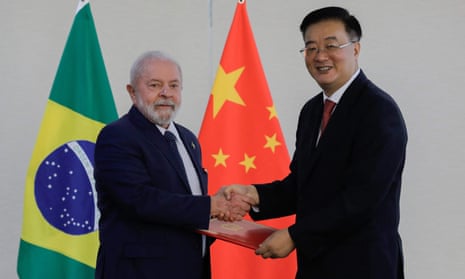
‘Brazil is back’: Lula to visit Xi as he resets diplomatic relations with China
Meeting is part of high-profile tour as Brazil’s president attempts to repair country’s reputation after the Bolsonaro era
One of them wants the world to know his country is battling its way back to its former glory after three years of zero-Covid lockdowns and a long and humiliating history of foreign exploitation.
The other wants to signal his country is bouncing back from four chaotic years under a far-right populist who took a sledgehammer to its place in the world.
The two revival-seeking politicians – China’s leader, Xi Jinping , and the Brazilian president, Luiz Inácio Lula da Silva – will meet in Beijing next week during a high-profile tour that is part of the latter’s efforts to repair his country’s overseas reputation after Jair Bolsonaro’s era of antagonism and isolation.
Lula’s 26-31 March visit – on which he will take scores of the most powerful figures in Brazilian politics, industry and agribusiness – comes hot on the heels of trips to the United States and Argentina, Brazil’s most important trade partners after China.
Political scientist Cláudio Couto said those trips were designed to emphasize how sensible, stable government had returned to South America’s biggest economy after four topsy-turvy years during which Bolsonaro insulted and alienated allies , from Paris to Beijing .
“The top message is that Brazil is back to normal,” Couto said, recalling the repeated anti-China attacks from Bolsonaro and his allies.
Margaret Myers, a specialist in China-Latin America relations from the Wilson Center thinktank, suspected Beijing would be delighted at the return of Lula, an affable pragmatist who made two state visits there during his first 2003 to 2011 presidency.
Back then, Myers remembers chummy photographs of Lula and China’s then leader Hu Jintao being splashed over Chinese magazine covers. “There was this sort of love affair with Lula that I’d never really seen – certainly not with any other Latin American presidents and few others,” she said.
“So this will be [viewed as] a bit of a homecoming … and an effort to demonstrate that this relationship is not only alive and well but thriving … He will be met with a lot of excitement.”
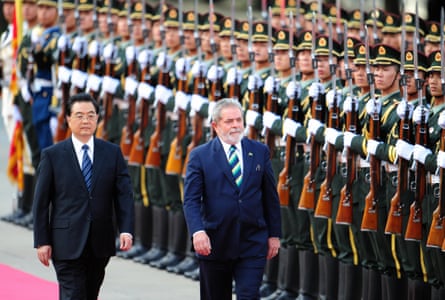
Thriving ties with Beijing are crucial to Brazil’s 77-year-old leader, who managed to bankroll transformational social programs during his first stint in power partly thanks to China’s insatiable appetite for commodities such as soy beans and iron ore.
The visit will also bolster Xi’s campaign to position himself as a global statesman and would-be peacemaker determined to stamp China’s mark on world affairs from eastern Europe to the Middle East and Latin America.
“They are useful to one another,” the international relations professor Matias Spektor said of Lula and Xi.
“In Lula’s case, it helps [send a message] to a domestic audience, to other South American countries and the United States that Brazil is back. And from Xi Jinping’s point of view it also shows that even in a region like Latin America that was traditionally one of US influence, China has leverage.”
The scale of Lula’s visit will be less thrilling to Washington given the dismal state of US-China ties and what analysts call the Brazilian’s underwhelming call on Joe Biden in the White House last month.
“It was a very frustrating visit,” said Spektor, a visiting scholar at Princeton University.
Despite hopes Biden and Lula would bond over the battles against climate change and political extremism, Spektor said the Brazilian delegation had been disappointed by the level of funds offered to help combat Amazon deforestation, which soared under Bolsonaro. The lack of US enthusiasm for Lula’s offer to help broker peace between Moscow and Kyiv also irked the Brazilians.
“The Brazilian side was so dissatisfied with what it got from the American side that Lula took the decision to meet Biden’s enemies in the Democratic party [Bernie Sanders and Alexandria Ocasio-Cortez] before meeting Biden himself,” Spektor said of what he called Lula’s brief and tense visit.
Lula’s trip to Beijing and Shanghai – which China’s foreign ministry claims “will open up new prospects in China-Brazil relations in the new era” – is set to be a far more extravagant affair.
His delegation reportedly includes more than 200 business leaders, including the billionaire owners of the meat processing giant JBS , half a dozen ministers, three state governors and dozens of lawmakers, among them the senate president, Rodrigo Pacheco. Lula will be received by both Xi and his close ally Li Qiang , the former Communist party chief of Shanghai who was recently named China’s new premier.
“Lula is giving enormous political importance to this trip – much more than the trip to the US … Even if he isn’t trying to send a message [to the US], he ends up sending one,” said Spektor, who believed Brazil’s strategy was to play the world’s two largest economies off against each other.
“This is what Brazil wants: to go to China, to try and get more concessions from the US. And after that go to the US to try to get more concessions from China … They are hedging their bets.”
Lula has insisted he is not taking sides in the rancorous tussle between Washington and Beijing. “I’m not going to get into a cold war with anyone,” Lula said last month, claiming he wanted “splendid” relationships with both.
Myers played down the potential for US displeasure, noting that Lula had visited Biden before Xi. “Certainly Brazil is trying to play both sides – and legitimately so,” she added.
But Spektor said that by undertaking such a high-profile tour of China after such a lackluster excursion to the US, Lula risked signalling to Washington that he was aligning himself with Beijing.
“This wouldn’t be correct. This isn’t the intention of Lula’s government,” he said. “But there is the risk that this is how it will be interpreted in Washington.”
- Luiz Inácio Lula da Silva
- Asia Pacific
Most viewed
clock This article was published more than 1 year ago
Lula tells Xi ‘nobody can stop’ Brazil-China relationship
TAIPEI, Taiwan — Brazilian President Luiz Inácio Lula da Silva met with Chinese President Xi Jinping in Beijing on Friday and praised the strength of the countries’ relationship. The meeting comes at a time when Xi has projected an image of China as the leader of a world order that is unconstrained by the United States.
“Our relationship with China is extraordinary, and it has become more mature and stronger over time,” Lula told Xi, according to Chinese state media. “We hope that Brazil-China relations are able to go beyond trade. Nobody can stop Brazil from continuing to develop its relationship with China.”
Lula’s meeting with Xi follows a parade of recent visits by other world leaders to China, including the leaders of France, Spain, Singapore and Malaysia, as well as Belarusian President Alexander Lukashenko , a close ally of Russian President Vladimir Putin, whom Xi met late last month in Moscow.
China’s spate of high-level diplomacy is occurring as Xi positions China as a diplomatic power broker, offering a proposal to end Russia’s war in Ukraine and mediating a rapprochement between Saudi Arabia and Iran.
German Foreign Minister Annalena Baerbock also was in Beijing on Friday. While meeting with Chinese Foreign Minister Qin Gang, she said that Europe would view any military escalation in the Taiwan Strait as “a horror scenario” that would have “inevitable repercussions.”
It was a stance many in Europe felt needed to be restated after French President Emmanuel Macron raised eyebrows when he seemed to endorse China’s approach to the island of Taiwan — which Beijing has never ruled but claims as part of its territory — during his own trip to the Chinese capital this month.
Xi rolled out the red carpet Friday to welcome Lula, who has enjoyed a close relationship with China’s leaders for nearly two decades. As the two reviewed troops in Tiananmen Square, which was lined with Brazilian flags, Xi flashed a rare smile.
The trip, Lula’s third state visit to China, indicates a repairing of relations after a period of strain under Lula’s predecessor, Jair Bolsonaro, who had antagonized Beijing.
Xi described Lula as “an old friend of the Chinese people” and, according to Chinese state media, said China views its relations with Brazil as a “diplomatic priority.”
During the meeting between Lula and Xi, the two sides signed agreements on science and technology cooperation, including the extension of an ongoing satellite project, and on customs inspections for animal products, and agreed to expand trade in each other’s respective currencies, according to a joint statement released by Chinese state media. The statement also said that Brazil viewed Xi’s 12-point proposal to end hostilities in Ukraine positively and that China supports Brazil’s desire to play a greater role in the United Nations, where Lula has advocated for Brazil to gain a permanent seat on the Security Council.
Lula traveled with a large entourage of Brazilian government ministers and business executives, and he visited several of China’s leading companies. On Thursday, with the chairman of the telecommunications giant Huawei by his side, Lula tried out virtual reality headgear at Huawei’s Shanghai Research Institute and later toured the electric-vehicle company BYD.
During Lula’s first tenure as president, from 2003 to 2011, China went from having little trade with Brazil to being its top trading partner. This week, Lula praised recent steps to bring the two economies even closer together — including an agreement enabling the two to make deals in their respective currencies.
The move gives Brazilian and Chinese companies the option to bypass the U.S. dollar for the transactions that make up their booming bilateral trade, which last year topped $150 billion.
Wider use of China’s yuan is likely to make the currency more appealing to other countries looking to insulate themselves against the fluctuations in the U.S. dollar, as well as those keeping up trade with Russia, for the most part conducted in U.S. dollars, in the face of U.S. sanctions on Moscow over its war in Ukraine.
The decision by China and Brazil to enable their firms to trade in each other’s currencies could encourage Brazil’s neighbors to follow suit, said Cui Shoujun, the director of the Center for Latin American Studies at Renmin University of China, calling it “a big breakthrough.”
“If some part of that volume was settled in yuan, it could create a demonstration effect and encourage more countries in Latin America to trade in the Chinese currency,” Cui said.
China is the top trading partner not only for Brazil but also for Chile and Peru. Last year, China’s two-way trade with Latin America grew to $486 billion, more than 40 times the level in 2000, according to Chinese customs data.
The West hoped Lula would be a partner. He has his own plans.
Many countries in Central and South America holding debt denominated in U.S. dollars faced a crisis in the 1980s when the United States raised interest rates. Experts say that this experience motivated countries to move away from such heavy reliance on the dollar and that this diversification overlapped with a steady increase in the region’s trade with China.
There also are synergies with Russia, another country that shares a desire to create an alternative to the American-led world order. Bilateral trade between Russia and Brazil reached record highs last year, mainly driven by Russian fertilizer, which sustains Brazil’s agricultural sector. Brazil’s farm products — primarily soybeans and beef — comprise the vast majority of the country’s exports to China. At the same time, Russia is using the Chinese yuan more than ever amid American sanctions on Russian economic activity.
“In Latin America, we are seeing China acting as this alternative [to the U.S.], especially from a financing and investment perspective, and really reducing the efficacy of U.S. efforts to shift policy or political behavior in much of the region,” said Margaret Myers, the director of the Asia and Latin America program at the Washington think tank the Inter-American Dialogue.
Beijing has praised its deepening economic cooperation with Brazil. After meeting with Lula adviser Celso Amorim, Chinese Foreign Minister Wang Yi said that with the closer ties, China would contribute to “promoting the change of the global governance system.”
Brazil is looking to China as a partner not just in achieving its economic goals but also in attaining its technological and environmental objectives, said Karin Costa Vazquez, a Brazilian scholar at the Center for BRICS Research Studies at Fudan University in Shanghai.
“One of the transformations the country needs to go through is the transition to a low-carbon economy. That’s at the top of Lula’s domestic agenda,” Costa Vazquez said. “Technology, sustainability and innovation have been at the core of China’s policies; that’s what China can contribute.”
By embracing Putin, Xi defies the U.S. and exploits a global divide
Although Brazilian and Chinese firms have the option to carry out transactions in yuan, there are many incentives to conduct trade in the U.S. dollar, which remains the most widely used currency in the world.
“When China and Brazil sign an agreement like this, it’s trying to put into place the infrastructure that would make it possible to use China’s currency, but that doesn’t mean that individual firms are going to choose that,” said Daniel McDowell, an associate professor of political science at Syracuse University.
On Thursday at the Shanghai headquarters of the BRICS New Development Bank, which China and Brazil launched in 2015 to serve as an alternative to the International Monetary Fund, Lula witnessed his successor Dilma Rousseff inaugurated as the bank’s new head.
In a speech at the bank, Lula said he had long asked himself why dependence on the U.S. dollar persisted.
“Why can’t we use our own currencies?” Lula asked. “I know you all got used to using U.S. dollars. But in the 21st century, we can try something different.”
Li reported from Seoul.

Brazil's Lula reschedules China trip, will meet Xi on April 14 in Beijing
- Medium Text
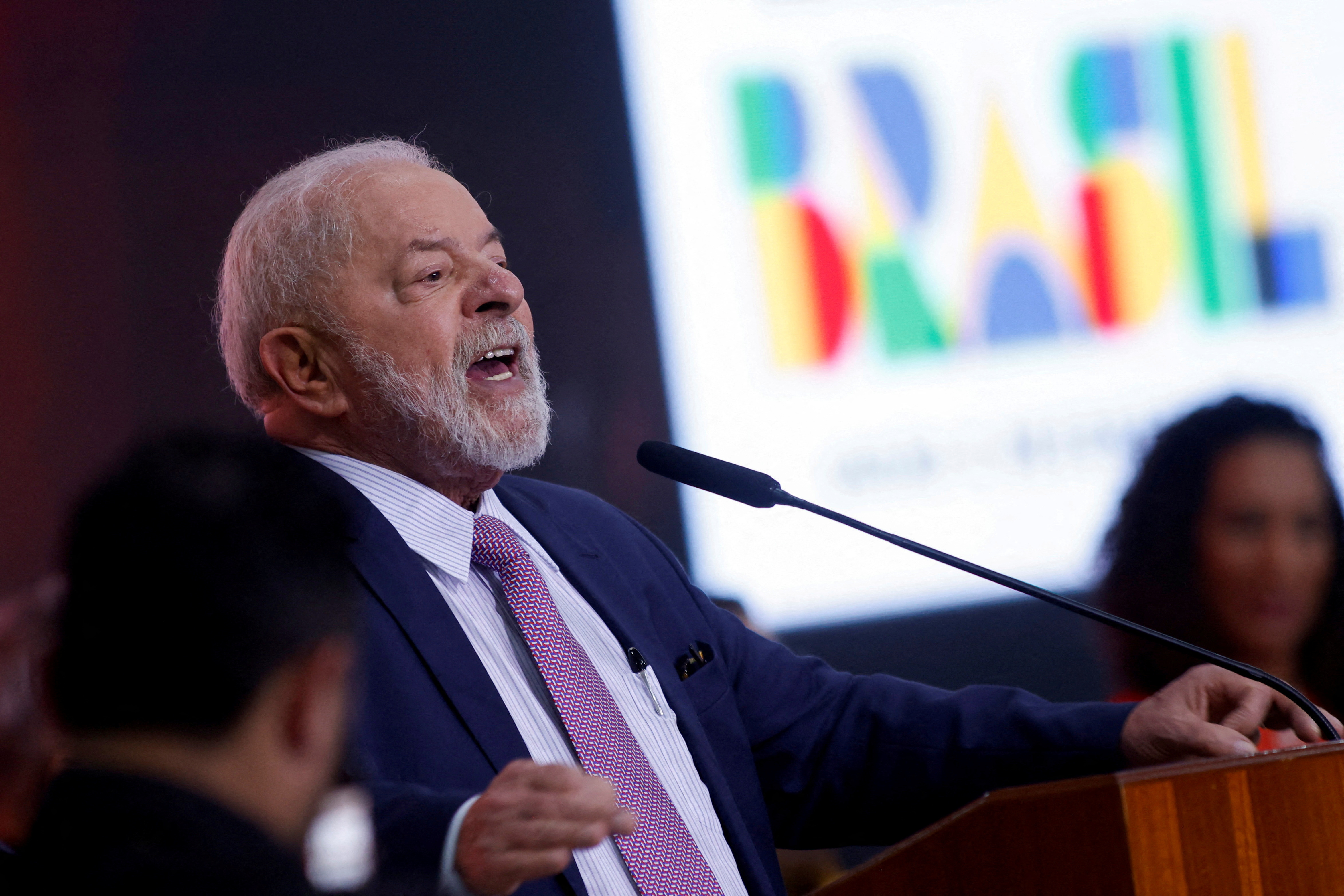
The Reuters Daily Briefing newsletter provides all the news you need to start your day. Sign up here.
Reporting by Lisandra Paraguassu Editing by Frances Kerry and Josie Kao
Our Standards: The Thomson Reuters Trust Principles. New Tab , opens new tab
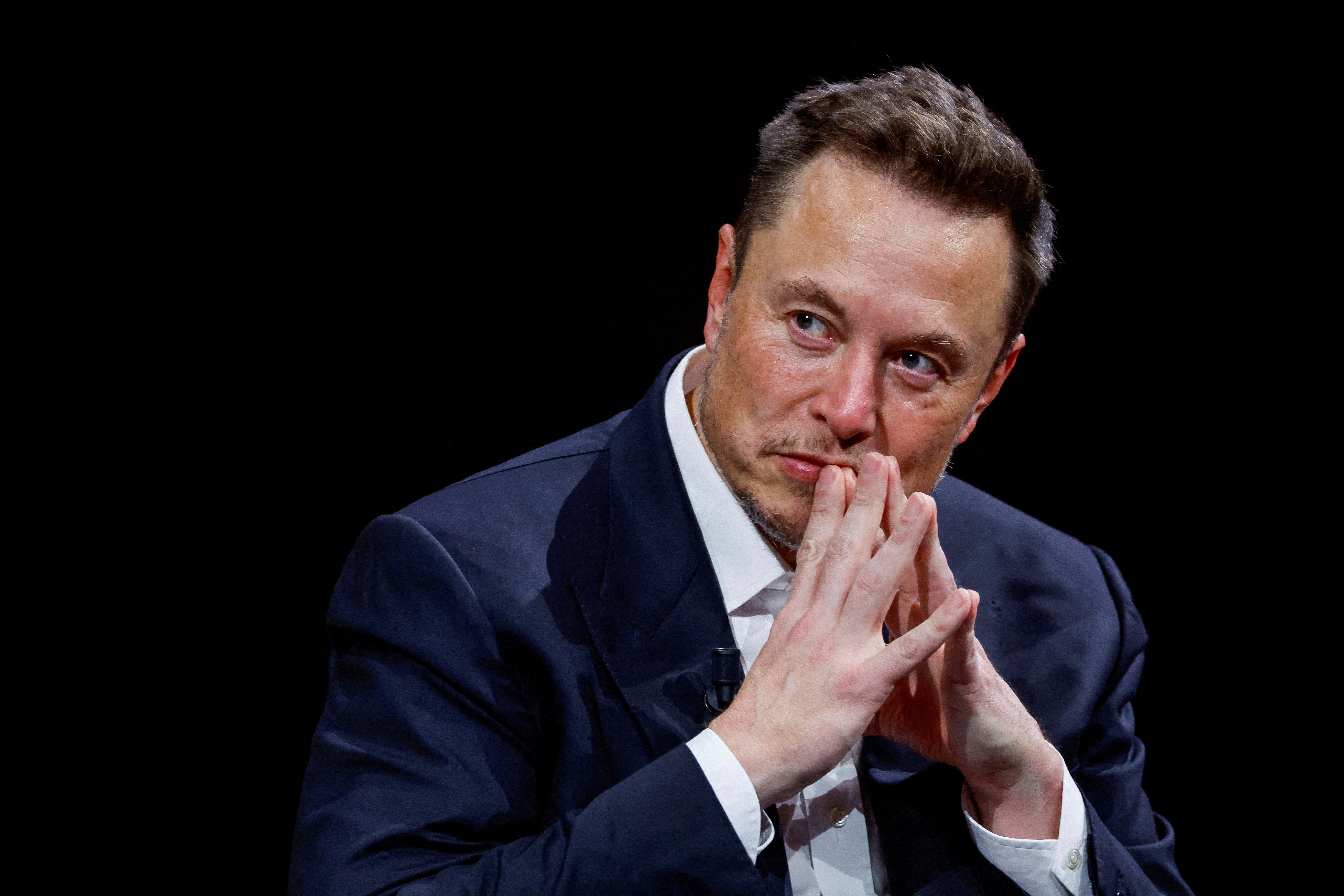
Mexican soldiers arrested Abraham Oseguera, the brother of Nemesio "El Mencho" Oseguera who leads the hyper-violent Jalisco New Generation Cartel (CJNG), officials said on Monday, touting the capture as a major blow to organized crime.
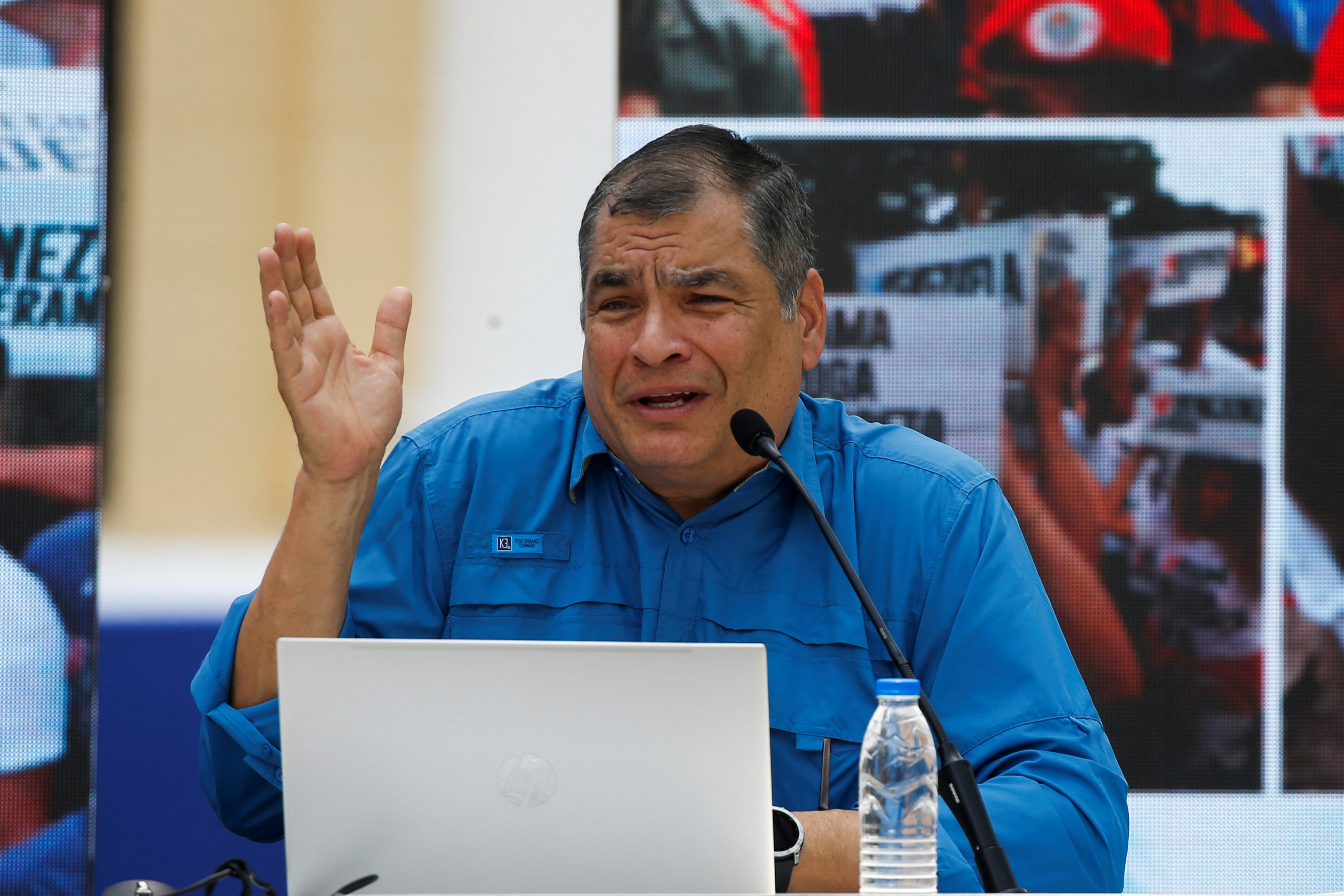
Argentine President Javier Milei boasted on Monday that his government is successfully taming profligate public spending, touting a rare first quarter surplus that he argues is key to improving economic prospects in the Latin American nation.

World Chevron
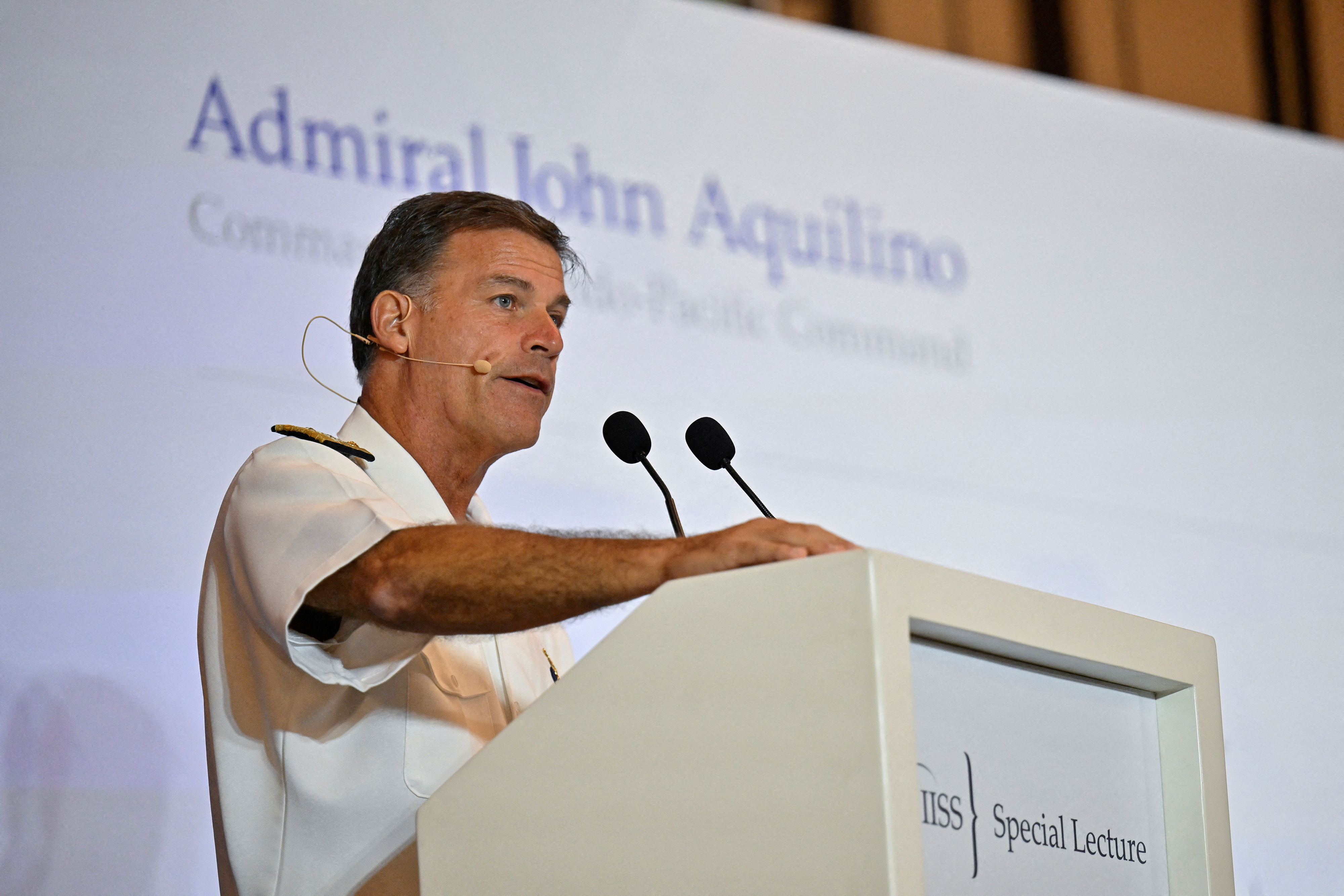
China's military spending concerning given 'failing economy', US admiral says
The increase in China's defence spending is concerning given its economy is "failing", the head of the U.S. Indo-Pacific Command said on Tuesday.

German police have arrested an assistant to a European Parliament member for the far-right Alternative for Germany on suspicion of "an especially severe case" of espionage for China, the federal prosecutor's office said on Tuesday.
- Election 2024
- Entertainment
- Newsletters
- Photography
- Personal Finance
- AP Investigations
- AP Buyline Personal Finance
- AP Buyline Shopping
- Press Releases
- Israel-Hamas War
- Russia-Ukraine War
- Global elections
- Asia Pacific
- Latin America
- Middle East
- Election Results
- Delegate Tracker
- AP & Elections
- Auto Racing
- 2024 Paris Olympic Games
- Movie reviews
- Book reviews
- Personal finance
- Financial Markets
- Business Highlights
- Financial wellness
- Artificial Intelligence
- Social Media

Brazil’s Lula cancels trip to China because of pneumonia
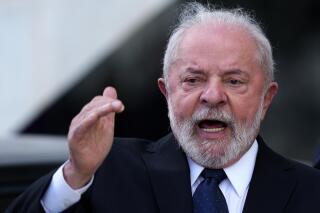
Brazil’s President Luiz Inacio Lula da Silva speaks during his visit to the Brazilian Navy Command, in Brasilia, Brazil, Wednesday, March 15, 2023. (AP Photo/Eraldo Peres)
- Copy Link copied
RIO DE JANEIRO (AP) — Brazil’s President Luiz Inácio Lula da Silva has canceled his trip to China after contracting pneumonia, the presidential palace said on Saturday.
Lula, 77, was admitted to a hospital in the capital of Brasilia with flu-like symptoms and was diagnosed with “bacterial and viral bronchopneumonia due to influenza A,” the palace said in a statement, quoting a medical note signed by Dr. Ana Helena Germoglio.
The leftist leader’s health was reassessed on Saturday and, despite improvement, he was advised to “postpone the trip to China until the cycle of viral transmission ends,” the medical note said. His press office later confirmed that the trip had been canceled.
Chinese authorities have been informed, “with the reiteration of the desire to schedule the visit on a new date,” the palace said.
Lula had been expected to leave for China on a multi-day visit on Friday or Saturday, but the trip was pushed back on Friday.
A delegation composed of ministers, senators, lawmakers and hundreds of businessmen - including more than 100 from the agricultural sector - had been set to accompany Lula during his first state visit to Brazil’s biggest trade partner since taking office in January.
The trip’s cancellation is “bad news” for the government as the visit was “an opportunity for Lula to reconnect with business elites, especially in the agribusiness, who have been very much pro-Bolsonaro,” said Oliver Stuenkel, a political scientist from the Getulio Vargas Foundation think tank.
The Brazilian president and his Chinese counterpart Xi Jinping were scheduled to meet next Tuesday. Trade, investment and climate change were on the agenda and 20 bilateral agreements had been expected to be signed, according to a statement Thursday from the presidential palace.
Lula, who rarely postpones or cancels trips due to health reasons, traveled to Argentina in January and the U.S. in February, marking a departure from Brazil’s foreign policy under former far-right President Jair Bolsonaro, who showed little interest in international affairs or travel abroad.
The cancellation “will raise questions about to what extent Lula can sustain the very intense diplomatic activism” seen in the first three months of his presidency, Stuenkel said.
Pedro Brites, an international relations expert at the Getulio Vargas Foundation, said the postponement of the trip was a lost opportunity to switch the focus to more positive issues for the government “after a turbulent week.”
On Wednesday, federal police cracked down on a gang accused of plotting assassinations and kidnappings of public officials including Sen. Sergio Moro, who was the lead judge in the Carwash trials which led to the arrest of prominent politicians including Lula.
The then-former president spent over a year in jail before his conviction was annulled. In 2019, Moro became Bolsonaro’s Justice Minister.
The leftist leader on Thursday suggested the police operation was a setup by Moro, prompting fierce criticism by opposition politicians and discomfort among allies.
Rescheduling Lula’s visit to China will be a challenge due to the very crowded agendas of both leaders, said Stuenkel, but he predicted Lula “will really try to make this happen during the first half of the year” due to the high domestic and international importance of the trip.
Lula had been intending to normalize and strengthen ties with China after a rocky period of tensions under former far-right leader Jair Bolsonaro.
Commercial ties continued but political relations with China soured during Bolsonaro’s term -- a particular low point came when Bolsonaro’s son Eduardo blamed the COVID-19 pandemic on the Chinese Communist Party in March 2020.
We've detected unusual activity from your computer network
To continue, please click the box below to let us know you're not a robot.
Why did this happen?
Please make sure your browser supports JavaScript and cookies and that you are not blocking them from loading. For more information you can review our Terms of Service and Cookie Policy .
For inquiries related to this message please contact our support team and provide the reference ID below.
Brazil's Lula criticises US dollar and IMF during China visit
The two countries have recently announced a deal to trade in their own currencies, dropping the dollar as an intermediary. Lula also criticised the IMF, accusing it of 'asphyxiating' the economy of certain countries.
Issued on: 14/04/2023 - 03:25
Brazilian President Luiz Inacio Lula da Silva criticised the outsize role of the US dollar in the world economy and lashed out at the IMF on Thursday during an official visit to China .
The veteran leftist, whose government recently announced a deal with Beijing to trade in their own currencies – ditching the dollar as an intermediary – is in China to boost ties with his country's top trading partner and spread his message that "Brazil is back" as a key player on the global stage.
"Why should every country have to be tied to the dollar for trade?... Who decided the dollar would be the (world's) currency?" Lula said in Shanghai at a ceremony to inaugurate his political ally Dilma Rousseff as president of the development bank set up by the BRICS nations (Brazil, Russia , India , China and South Africa ).
"Why can't a bank like the BRICS bank have a currency to finance trade between Brazil and China, between Brazil and other BRICS countries?... Today, countries have to chase after dollars to export, when they could be exporting in their own currencies."
Lula also had strong words for the International Monetary Fund, alluding to accusations the IMF forces overly harsh spending cuts on cash-strapped countries like Brazil's neighbour Argentina in exchange for bailout loans.
"No bank should be asphyxiating countries' economies the way the IMF is doing now with Argentina, or the way they did with Brazil for a long time and every third-world country," he said. "No leader can work with a knife to their throat because (their country) owes money."
'Brazil is back!'
Lula, who took office in January, is looking to reposition Brazil as a global go-between and deal broker, seeking friendly ties across the board after four years of relative isolation under his far-right predecessor, Jair Bolsonaro .
He is due to meet with Chinese counterpart Xi Jinping in Beijing on Friday, and also visited US President Joe Biden in February.
"Brazil is back!" Lula promised in Shanghai, where he arrived on Wednesday night. "The time when Brazil was absent from major world decisions is in the past. We are back on the international stage, after an inexplicable absence."
One of the main topics on the agenda when Lula and Xi meet on Friday is expected to be the Ukraine war. Both China and Brazil have positioned themselves as mediators in the conflict, despite Western concerns that they are overly cosy with Russian President Vladimir Putin . Both countries have refused to join Western nations in imposing sanctions on Russia for its invasion.
The Shanghai leg of Lula's trip highlighted another key goal of the visit – - deepening trade ties between the Asian giant and Latin America 's biggest economy. China is Brazil's biggest export market, buying tens of billions of dollars' worth of soybeans, beef and iron ore.
Under the currency deal announced in March, Brazil and China have named two banks – one in each country – to conduct their massive trade and financial transactions by directly exchanging yuan for reais and vice versa, instead of going through the dollar. China has similar deals with Russia, Pakistan and several other countries.
After Rousseff's inauguration, Lula visited a research centre run by Chinese telecom giant Huawei . Huawei's chair walked him through an exhibition showcasing the company's extensive presence in Brazil – a contrast with the United States, where companies are effectively barred from doing business with the firm.
Lula also met the head of China's biggest electric carmaker, BYD, which said in October that it planned to set up a vehicle manufacturing plant in northern Brazil's Bahia after Ford Motors closed its factory there. The company is already making electric buses and cars in Brazil for the Latin American market.
Lula, who previously led Brazil from 2003 to 2010, is seeking to smooth relations with China, after ties deteriorated under Bolsonaro.
The 77-year-old president was initially scheduled to make the trip in late March, but had to postpone it after coming down with pneumonia.
He is travelling with a large delegation of about 40 high-level officials, including cabinet ministers, governors and members of Congress.
Daily newsletter Receive essential international news every morning
Take international news everywhere with you! Download the France 24 app
- Luiz Inacio Lula da Silva
The content you requested does not exist or is not available anymore.

Liu Xin co-leads the Global Times China desk. She covers topics on China’s Xinjiang region, religious fields, border areas and ...
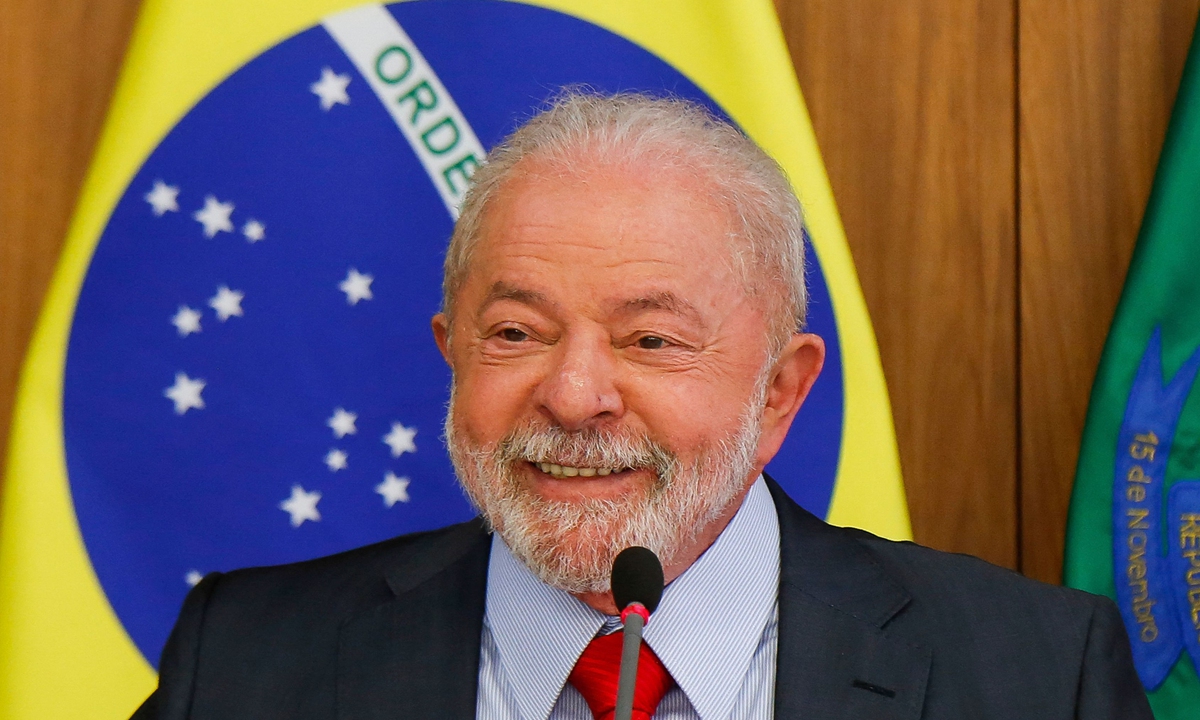
Brazilian President Luiz Inácio Lula da Silva Photo: VCG
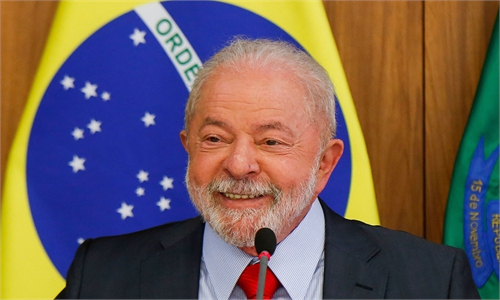
After Brazil informed China on the postponement of President Lula’s visit to China due to illness, China expressed ...
China has expressed understanding and sent warm thoughts to Brazil's President Luiz Inacio Lula da Silva after he ...
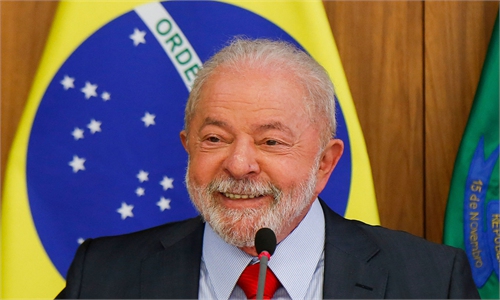
After recovering from pneumonia, Brazilian President Luiz Inácio Lula da Silva will reportedly visit China from Tuesday to ...

- 1st LD-Writethru: Xi, Lula send congratulatory letters to seminar involving CPC, Workers' Party of Brazil
BEIJING, April 9 (Xinhua) -- Xi Jinping, general secretary of the Communist Party of China (CPC) Central Committee and Chinese president, and Luiz Inacio Lula da Silva, honorary president of the Workers' Party of Brazil (PT) and Brazilian president, have sent congratulatory letters separately to the 7th theory seminar of the CPC and the PT held in Beijing on Tuesday.
In his letter, Xi said that the 20th National Congress of the CPC in October 2022 made it clear that the Party's central task is to lead the Chinese people of all ethnic groups in a concerted effort to realize the Second Centenary Goal of building China into a great modern socialist country in all respects and to advance the rejuvenation of the Chinese nation on all fronts through a Chinese path to modernization.
Xi noted that after the PT returned to power in January 2023, it had vigorously promoted development strategies and stayed committed to achieving sustainable and comprehensive development of Brazil.
He said the seminar focused on strengthening the ruling party building and exploring the path to modernization, which is timely and of great significance to strengthening the capacity building of the ruling parties of the two countries and exploring the modernization paths suited for their own national conditions.
Xi also noted that this year marks the 50th anniversary of the China-Brazil diplomatic ties and the 40th anniversary of the establishment of the CPC-PT relations.
The CPC is willing to deepen exchanges and mutual learning with the PT on governance, and promote party building and national development, so as to make greater contributions to the continuous development of China-Brazil relations in the new era and the building of a community with a shared future for mankind, Xi said.
Lula said in his letter that last year, he and General Secretary Xi had worked together to take the two countries' comprehensive strategic partnership to a new level.
Brazil-China relations are important not only to the two countries but also to the whole world, Lula said, noting that the two sides will work together to consolidate traditional mechanisms of global governance such as the United Nations, while strengthening key mechanisms of South-South cooperation such as the Group of 77 and China, BRICS, the China-CELAC Forum and the BASIC countries.
Lula said that the relationship between the PT and the CPC is an important part of the relationship between the two countries. The visit to China by the delegation of senior Workers' Party officials and their attendance at the seminar aimed to exchange experience on governance and conduct in-depth discussions and cooperation with the CPC on issues of common interest.
He expressed the confidence that the exchanges between the two parties, the two governments and the two peoples will be closer and more fruitful. Enditem
Go to Forum >> 0 Comment(s)
Add your comments....
- User Name Required
- Your Comment
Valor International / Foreign Affairs
- Minha conta
Lula advocates for L.A. trade integration during visit to Colombia
Brazilian president urges neighbors to “overcome their fears” of regional commerce.
Por Murillo Camarotto, Renan Truffi, Mariana Assis — Bogotá, Brasília
18/04/2024 10h22 Atualizado 18/04/2024
Brazilian ministers Simone Tebet and Marina Silva with presidents Lula and Petros — Foto: Ricardo Stuckert/PR
During his visit to Colombia, President Lula advocated for increased commercial integration in Latin America, while the neighboring country expressed interest in joining the BRICS, a group of emerging nations aiming to counterbalance the major global powers.
Economic agenda dominated discussions between Mr. Lula and Colombian President Gustavo Petro. According to the Brazilian leader, Latin American countries must “overcome their fears” to enhance regional integration and trade. Mr. Lula criticized Brazil for historically “turning its back on Latin America.”
“Currently, Brazil’s trade flow with South America stands at $42 billion, but it could reach $60 billion, even $70 billion if we were not afraid of ourselves,” Mr. Lula remarked during a forum with business leaders from both countries in Bogotá.
The president also regretted the bureaucratic hurdles that hinder the expansion of commercial flows and regional integration. “We have never been so separated,” he complained.
Alongside Mr. Petro, the Brazilian president proposed that regional countries explore the idea of establishing a regional development bank. “We cannot rely on the World Bank all the time,” he said.
Concerning Colombia’s potential membership in the BRICS, Mr. Lula pledged to champion the request with other bloc members. Originally established by Brazil, Russia, China, and India, the BRICS later welcomed South Africa and, more recently, expanded to include Egypt, Ethiopia, Saudi Arabia, the United Arab Emirates, and Iran.
According to the president, Latin Americans need to “determine how big we want to be.” “And I propose to stop being afraid. We have the potential to triple trade between Brazil and Colombia,” the Brazilian leader added.
In another initiative, Mr. Petro suggested strategic partnerships between the two countries, particularly in areas related to clean energy generation. “We have enormous advantages over most countries on the planet in producing clean energy.”
Alongside environmental concerns, democracy was a focal point of Mr. Lula’s visit to the neighboring country. A speech distributed by the Planalto Palace highlighted Brazil and Colombia’s mutual belief “that ballots and democracy pave the way forward.” The statement was intended for delivery during lunch with Mr. Petro. However, the government later clarified that the speech was not delivered. “For the first time in history, we have governments that share the commitment to make our societies fairer, more inclusive, and sustainable,” the speech read.
According to the text, relations between Brazil and Colombia are “essential for the prosperity of South America.” “We are two great multicultural democracies, marked by the valuable contributions of indigenous peoples and Afro-descendants,” added the distributed speech, which emphasizes that the Amazon rainforest “unites us with its human and natural riches and the potential for a tropical bioeconomy.”
(The journalist’s travel was facilitated by an invitation from Apex.)
Translation: Carlos Dias
Expectations give Central Bank breathing room to keep forward guidance
Government mulls using only one dose of vaccine at first, união química gears up to make russian vaccine in brazil, amazon starts offering logistics services to retailers, home-bound brazilians going with large screen tvs, intelbras aims to raise r$1.2bn with ipo, gol to conclude merger with smiles by april 19, tarpon reviews strategy and draws new partners.
In a sort of relaunch, investment firm gathered three new partners in new holding company

Health regulator clears vaccines, São Paulo starts inoculation
European sugar producers press against concessions to brazil.
Trade organizations ask for review of EU-Mercosur agreement and exclusion from future pacts with Australia and Thailand

- Work & Careers
- Life & Arts
Become an FT subscriber
Try unlimited access Only $1 for 4 weeks
Then $75 per month. Complete digital access to quality FT journalism on any device. Cancel anytime during your trial.
- Global news & analysis
- Expert opinion
- Special features
- FirstFT newsletter
- Videos & Podcasts
- Android & iOS app
- FT Edit app
- 10 gift articles per month
Explore more offers.
Standard digital.
- FT Digital Edition
Premium Digital
Print + premium digital, weekend print + standard digital, weekend print + premium digital.
Today's FT newspaper for easy reading on any device. This does not include ft.com or FT App access.
- 10 additional gift articles per month
- Global news & analysis
- Exclusive FT analysis
- Videos & Podcasts
- FT App on Android & iOS
- Everything in Standard Digital
- Premium newsletters
- Weekday Print Edition
- FT Weekend Print delivery
- Everything in Premium Digital
Essential digital access to quality FT journalism on any device. Pay a year upfront and save 20%.
- Everything in Print
Complete digital access to quality FT journalism with expert analysis from industry leaders. Pay a year upfront and save 20%.
Terms & Conditions apply
Explore our full range of subscriptions.
Why the ft.
See why over a million readers pay to read the Financial Times.
International Edition
- Quick access
- Government Agencies
- Access to Information
- Legislation
- Accessibility
- Reset Cookies
- Switch to high contrast mode
FOREIGN AFFAIRS
"We need to make a commitment to export sustainability," says Lula in Colombia
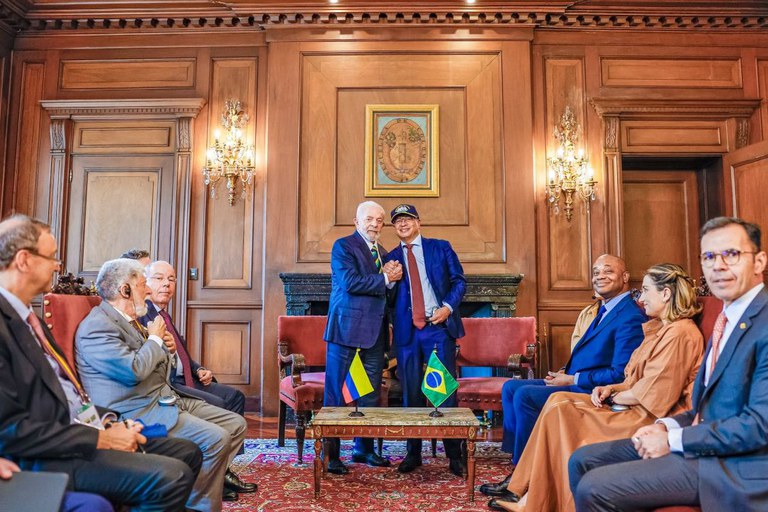
Presidents Lula and Gustavo Petro during a bilateral meeting. Photo: Ricardo Stuckert / PR
The agenda included discussions on protecting the Amazon rainforest and strengthening a well-structured, joint environmental agenda. Emphasis was given to the importance of establishing agreements in social and economic areas capable of expanding bilateral relations between the two countries and working on partnerships that promote cooperation between the police and military forces of the two nations.
The desire to unite the Caribbean, the Pacific, and the Amazon makes Colombia an indispensable partner. We need to take responsibility for defining which South America we want, which country we want, and which integration policy we want" LUIZ INÁCIO LULA DA SILVA President of the Republic
At the end of a comprehensive agenda, President Luiz Inácio Lula da Silva was certain: "The vocation to unite the Caribbean, the Pacific, and the Amazon makes Colombia an indispensable partner. We need to take responsibility for defining which South America we want, which country we want, and which integration policy we want".
» Statement by President Lula after a bilateral meeting with the President of Colombia
» President's speech at the closing of the Brazil-Colombia Business Forum
President Lula's visit to Bogotá was marked by an intense agenda, which included a bilateral meeting with Colombian President Gustavo Petro, participation in the Brazil-Colombia Business Forum and attendance at the opening of the 36th Bogotá International Book Fair (FILBo), the largest publishing and cultural event in the neighboring country.
The meeting between the two heads of state was also marked by the signing of international acts, including memorandums of understanding and terms of technical cooperation in various areas, and served to underline Brazil and Colombia's commitment to working together in a wide variety of sectors, mainly on issues related to biodiversity.
"We need to make a commitment to export sustainability. When President Petro took part in the Summit of Heads of State in South America (in May last year), he said that South America could be the 'Saudi Arabia of clean energy'. And President Petro is absolutely right. Most of the investment flow between our countries is already concentrated in the energy sector," said Lula, speaking at the Brazil-Colombia Business Forum.
NO FEAR – Recalling the progress made in trade relations between the two countries over the last 20 years, Lula sent a message to the businesspeople attending the Brazil-Colombia Forum: "My proposal to Colombian businesspeople and Brazilian businesspeople is: let's stop being afraid of each other. Let's bear in mind that Brazil and Colombia are in a position to triple our trade flow".
At the end of the meeting, while talking to journalists, Lula once again highlighted the potential of the partnership between the two countries in the energy field. He went on to list some crucial sectors on this agenda: "In the energy transition, we have the extraordinary possibility of attracting the whole world to contribute to investments, to the development of a new energy matrix. Whether it's green hydrogen, ethanol, biomass or solar energy".
Promoted by ApexBrasil and the trade promotion agency ProColombia, the Brazil-Colombia Business Forum featured panels on important topics such as technology, reindustrialization and productive integration, food security and infrastructure. Around 300 people from the Brazilian and Colombian governments, as well as the private sector and over 20 business leaders from different sectors in both countries, took part in the Forum.
When analyzing the trade balance and the prospects for business growth between the two countries around a green and decarbonized economy, Gustavo Petro said that the Amazon must unite Brazil and Colombia. "The Amazon jungle should not be seen as an abyss between the two countries. It is just the opposite. It has to be a bridge," said the Colombian president.
REAPPROXIMATION – Lula's visit to Colombia marks another stage in the process of rapprochement between the two countries, which began with Gustavo Petro's presence at the Brazilian leader's inauguration ceremony on January 1, 2023, and then with the Colombian head of government's visit to the meeting of South American presidents in Brasilia at the end of May last year. In addition, Lula will be present at the closing of the Amazon Technical-Scientific Meeting in July 2023 in Leticia, Colombia, an event prior to the Belém Summit.
Brazil and Colombia are aligned on building a collaborative environmental agenda since South America is currently at the heart of discussions on the environment and the fight against climate change. The two nations stand out for being the countries that have reduced deforestation the most in the world and will soon be at the center of global environmental discussions. Colombia will host the UN Biodiversity Summit, COP 16, in October this year, and Brazil is preparing to host COP 30 in Belém in 2025.
In addition to their affinities around the environmental agenda, Lula and Gustavo Petro have converging views on important issues such as South American integration, valuing traditional communities, and attention to border populations. Proof of this is that Brazil has once again taken part in the Peace Dialogue Table between the Colombian government and the National Liberation Army.
ACTS – Brazil and Colombia signed international acts on Wednesday, including memorandums of understanding and terms of technical cooperation in various areas, such as the rights of LGBTQIA+ population, migrants, the elderly, people with disabilities, and people living on the streets; combating human trafficking; agrarian development and family farming; communication and technology and cartography, among others.
FILBO – Also on Wednesday, Lula took part in the opening of the 36th Bogotá International Book Fair (FILBo), which this year has Brazil as its guest of honor. As such, Brazil will have its own large pavilion, which will be used to exhibit books by Brazilian authors. The Ministry of Culture will be present with a large program featuring more than 60 authors, as well as a cultural program curated by poet Stephany Borges. This will be the third time that Brazil has been honored at the fair, following the 1995 and 2012 editions. The fair, Colombia's largest publishing and cultural event, runs until May 2 and this year's theme is "Reading Nature". Attendance is estimated at over 600,000 people.
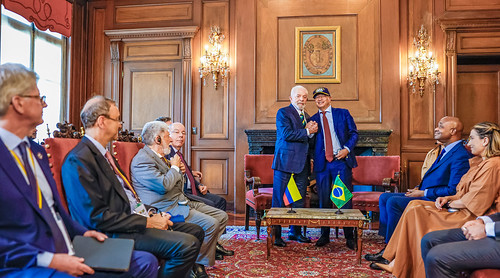
EXPORTING DAY – Between Wednesday and April 24, Apex will promote the launch of the Exporting Day program in both the Colombian capital and Medellín, the country's second largest city. The aim is to boost business with local entrepreneurs. The initiative will promote a commercial immersion in Colombia for a delegation of representatives from 13 Brazilian Information and Communication Technology (ICT) companies to deepen their knowledge of the main trends in the sector.
TRADE EXCHANGE – The two countries maintain a significant trade exchange, with Brazil being Colombia's third-largest partner, and Brazilian exports to the country have been on an upward trend since 2003. In the past year, trade between Brazil and Colombia totaled USD 6.1 billion, with Brazil exporting USD 3.8 billion worth of goods to Colombia and importing USD 2.3 billion.
Brazil is the main source of Colombian car and car parts imports (19% of the total) and paper and cardboard (19% of the total); and the second for cereals (21% of the total). Among Brazilian agricultural products exported to Colombia, sales of corn and unroasted coffee stand out, accounting for 12% and 5% respectively of the total exported by Brazil in 2023.
The bilateral relations between these two countries are marked by a growing enthusiasm across various sectors to deepen the integration of their national production chains. This trend is particularly notable in industries like automotive, pharmaceuticals, cosmetics, agri-food, defense, and herbal products. There is a considerable potential for boosting Brazilian exports, spanning both industrial and agricultural domains. Presently, approximately 70 Brazilian companies are actively operating within the country.
Brazil's President Lula creates two new Indigenous territories, bringing total to 10
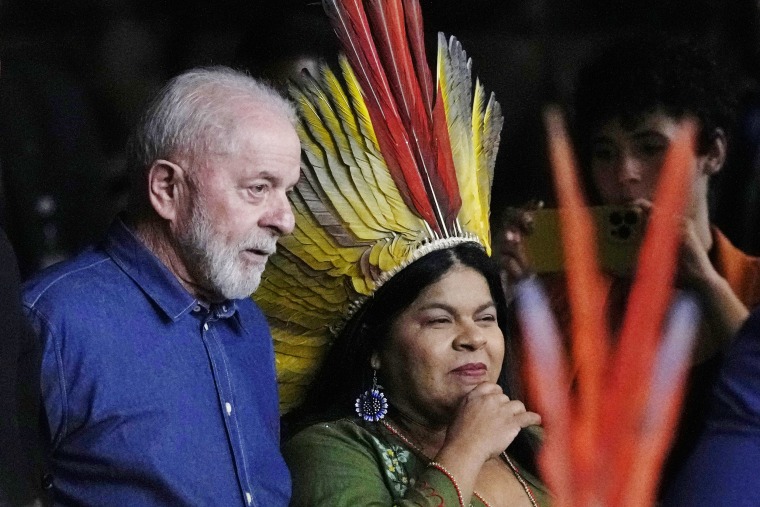
SAO PAULO — President Luiz Inácio Lula da Silva on Thursday announced the creation of two new Indigenous territories for Brazil, bringing the total number of new reserves during this term to 10.
The Cacique Fontoura reserve will be in Mato Grosso state and the Aldeia Velha territory will be in Bahia state. They will cover a combined total area of almost 132 square miles (342 square kilometers).
Speaking at a ceremony in Brasilia, Lula’s said Indigenous peoples should be patient as he seeks to fulfill his pledge of creating 14 new territories.
Lula’s predecessor, Jair Bolsonaro, had encouraged widespread development of the Amazon — both legal and illegal — and made good on his pledge to not demarcate a single centimeter of additional Indigenous land.
Lula took office in 2023 pledging to change that, but Indigenous rights activists hoped he would move faster. Last year, he demarcated six territories in April and two more in September.
The Brazilian president said during his speech that the latest two new territories would not be enough. He cited legal issues for the delay in setting aside additional lands.
“I know you have some concern because you were expecting six Indigenous lands. We decided to authorize two, and that frustrated some of our friends,” Lula said, standing next to his Indigenous peoples minister, Sônia Guajajara, who wore a traditional yellow feather headdress. “I did this so I wouldn’t lie to you. It is better to solve the problems instead of just authorizing it.”
The four envisioned Indigenous territories that were not authorized are occupied by farmers who have ownership rights to those lands, Brazil’s government said.
Indigenous leader Dinamam Tuxá told journalists he was “partially happy.”
“Every new Indigenous territory is a victory,” Tuxá said.
Last year, Brazil’s Supreme Court ruled to enshrine Indigenous land rights in a case brought by farmers seeking to block Indigenous peoples from expanding the size of their territorial claims.
The court rejected a legal theory arguing the date that Brazil’s constitution was promulgated — Oct. 5, 1988 — should be the deadline for when Indigenous peoples had to have already either physically occupied land or be legally fighting to reoccupy it.
Several lawmakers in Brazil’s Congress are still pushing to revive that theory and fit it into legislation.
Indigenous rights groups argued the concept of the deadline is unfair, saying it does not account for expulsions and forced displacements of Indigenous populations, particularly during Brazil’s two-decade military dictatorship.
The Associated Press

African Development Bank President Dr. Adesina to Visit Brazil [announcement]
A frican Development Bank president, Dr Akinwumi Adesina, will lead a delegation on an official visit to Brazil aimed at strengthening ties with the Portuguese-speaking country and to invite investor interest in Africa.
In Brazil from 22 -23 April 2024, Adesina will have an audience with President Luís Inacio Lula da Silva and meet representatives of key ministries, as well as hold discussions with representatives of the Brazilian private sector.
During the official visit, Brazil will formalise its membership of the Lusophone Compact, an agreement aimed at developing the private sector in the Portuguese-speaking countries of Africa known as the PALOPs. The move will open up new opportunities for the Brazilian private sector on the African continent.
"Brazil and the Portuguese-speaking African countries have strong historical, cultural and social ties and we need to work to strengthen economic ties through more investment, trade and cooperation. The Lusophone Compact will be an important instrument for supporting partnerships between the public and private sectors of Brazil and the Portuguese-speaking countries in Africa," said Simone Tebet, Brazilian Minister of Planning and Budget, in an official announcement on the visit.
The signing of the Lusophone Compact will be attended by the African Development Bank delegation, Secretary for Economic Affairs, Development, External Finance and Regional Integration Renata Amaral, and the ambassadors of Portugal, Angola, Cape Verde, Equatorial Guinea, Guinea-Bissau and Mozambique.

IMAGES
COMMENTS
FILE - Brazil's President Luiz Inacio Lula da Silva speaks during his visit to the Brazilian Navy Command, in Brasilia, Brazil, Wednesday, March 15, 2023. Brazil's President flew off to China on Tuesday to strengthen ties with his nation's biggest trade partner and win support for his long-shot push for peace in Ukraine.
2 of 5 |. FILE - Brazil's President Luiz Inacio Lula da Silva speaks during his visit to the Brazilian Navy Command, in Brasilia, Brazil, Wednesday, March 15, 2023. Brazil's President flew off to China on Tuesday to strengthen ties with his nation's biggest trade partner and win support for his long-shot push for peace in Ukraine.
CNN —. Brazil's President Luiz Inácio Lula da Silva is heading to China on a state visit this week, with talks with Chinese leader Xi Jinping expected to focus largely on trade, as well as ...
By Associated Press. Chinese leader Xi Jinping met with visiting Brazilian President Luiz Inácio Lula da Silva on Friday as part of a push to boost ties between two of the world's largest ...
Pool photo by Ken Ishii. President Luiz Inácio Lula da Silva of Brazil met in Beijing on Friday with China's top leader, Xi Jinping, and the two leaders declared in a joint statement that ...
Introduction. President Luiz Inácio Lula da Silva's (Lula) much anticipated state visit to China ended last weekend, following a two-week hiatus due to the president's pneumonia diagnosis in mid-March. Lula's visit to China was billed in the Brazilian press as a symbol of the South American giant's return to the world stage, following his predecessor Jair Bolsonaro's lower-profile ...
Lula will meet with Xi Jinping on March 28 in Beijing, the first foreign leader to visit the Chinese leader since he secured a precedent-breaking third term as president. The trip to China comes ...
The trip by Brazil's President Luiz Inácio Lula da Silva to Beijing has made clear he is counting on China to help reinvigorate the South American nation's ailing industrial sector. He's hoping that China can help pick up the slack of exiting U.S. companies. After Lula met Friday with China's President Xi Jinping, Brazilian finance minister Fernando Haddad told reporters the nations are ...
Lula's 26-31 March visit - on which he will take scores of the most powerful figures in Brazilian politics, industry and agribusiness - comes hot on the heels of trips to the United States ...
Brazilian President Luiz Inácio Lula da Silva, right, inspects an honor guard with Chinese President Xi Jinping during a ceremony held outside the Great Hall of the People in Beijing on Friday.
Brazil's new President Luiz Inacio Lula da Silva will meet Chinese leader Xi Jinping on March 28 on Lula's first trip of his current term to his country's largest trading partner, official sources ...
Simply sign up to the War in Ukraine myFT Digest -- delivered directly to your inbox. Brazilian president Luiz Inácio Lula da Silva will propose a "peace club" with China to mediate an end to ...
Brazil's President Luiz Inacio Lula da Silva will visit China this month accompanied by a delegation of 240 business representatives, including 90 from agriculture sector, a senior Foreign ...
Brazil's President Luiz Inacio Lula da Silva will meet with Chinese President Xi Jinping on April 14 in Beijing, his office said on Friday, rescheduling a visit that was postponed last week after ...
Lula, 77, came to power for the third time in January, after earlier leading Brazil from 2003 to 2010. In Shanghai, he will attend the inauguration on Thursday of his ally and former Brazilian ...
Brazil's President Luiz Inacio Lula da Silva speaks during his visit to the Brazilian Navy Command, in Brasilia, Brazil, Wednesday, March 15, 2023. (AP Photo/Eraldo Peres) RIO DE JANEIRO (AP) — Brazil's President Luiz Inácio Lula da Silva has canceled his trip to China after contracting pneumonia, the presidential palace said on Saturday ...
Lula said Brazil attached great importance to its relations with China, and was willing to deepen cooperation with China in politics, the economy, trade, education, science and technology, and ...
Brazilian President Luiz Inácio Lula da Silva on Wednesday officially kicked off his highly expected visit to China, after a brief delay due to his health condition. Lula arrived in Shanghai late ...
Brazil's President Luiz Inácio Lula da Silva, in bright blue jacket holding flowers, is visiting China, his fourth foreign visit in as many months.
Published: 10:00pm, 10 Apr 2023. Why you can trust SCMP. Brazilian President Luiz Inácio Lula da Silva, known as Lula, will begin his delayed visit to China this week, with a focus on boosting ...
April 12, 2024 at 5:45 PM PDT. Listen. 3:45. The billionaire Batista brothers' stunning comeback is thrusting them into Brazil's highest circles of power less than three weeks after their ...
Brazilian President Luiz Inacio Lula da Silva criticised the outsize role of the US dollar in the world economy and lashed out at the IMF on Thursday during an official visit to China. The veteran ...
After recovering from pneumonia, Brazilian President Luiz Inácio Lula da Silva will reportedly visit China from Tuesday to Friday, and experts said the visit will greatly raise bilateral ties to ...
The Financial Times reported on March 24 that Lula will propose a "peace club" with China to mediate an end to the conflict when he visits China. Lula has expressed hope to broker the Russia ...
BEIJING, April 9 (Xinhua) -- Xi Jinping, general secretary of the Communist Party of China (CPC) Central Committee and Chinese president, and Luiz Inacio Lula da Silva, honorary president of the ...
During his visit to Colombia, President Lula advocated for increased commercial integration in Latin America, while the neighboring country expressed interest in joining the BRICS, a group of emerging nations aiming to counterbalance the major global powers. ... Originally established by Brazil, Russia, China, and India, the BRICS later ...
Despite Brazil recording its second-largest-ever deficit in 2023, at 2.1 per cent of GDP, this year's goal of eliminating the shortfall remains intact, helped by one-off windfall receipts. The ...
President Lula's visit to Bogotá was marked by an intense agenda, which included a bilateral meeting with Colombian President Gustavo Petro, participation in the Brazil-Colombia Business Forum and attendance at the opening of the 36th Bogotá International Book Fair (FILBo), the largest publishing and cultural event in the neighboring country ...
SAO PAULO — President Luiz Inácio Lula da Silva on Thursday announced the creation of two new Indigenous territories for Brazil, bringing the total number of new reserves during this term to 10.
In Brazil from 22 -23 April 2024, Adesina will have an audience with President Luís Inacio Lula da Silva and meet representatives of key ministries, as well as hold discussions with ...